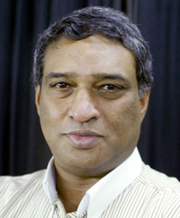Staring at a Human Security Catastrophe
NEW DELHI, Apr 28 (IPS) - The defining images of South Asia's battle against Covid-19 are hundreds of thousands of migrants, many with children on their shoulders, trudging from New Delhi, Kathmandu or Dhaka to their far-flung villages. They are daily wage earners engaged in construction, small enterprises, plying rickshaws or street selling in the informal sector.
With lockdowns and economic activity shut down to combat the virus, these migrants lost their low-paying jobs and were forced to flee to their rural homes. Those who remained in these cities face food insecurity, rising joblessness and risk falling deeper into poverty.

South Asia faces a major livelihoods crisis as the bulk of migrant employment in India, Pakistan, Nepal and Bangladesh is informal. India has roughly 80% of its people or 200-odd million workers in the informal sector engaged in non-agricultural activities.
This is the third disruptive shock faced by the informal sector after currency notes were suddenly withdrawn from circulation in November 2016 and a Goods and Services Tax introduced in July 2017. The share of the informal sector is higher at 91% in Bangladesh, followed by 78% in Nepal and 71% in Pakistan according to the International Labour Organisation.
"Covid-19 is likely to reverse many years, if not decades, of gains in poverty reduction and will widen inequalities further," Dr Nagesh Kumar, Director and Head of South Asia, United Nations Economic and Social Commission for Asia and the Pacific told IPS.
South Asia thus cannot afford to have the worst of both worlds: a viral pandemic with rising joblessness and poverty that heighten risks of social unrest. Migrants must be brought back to work in the cities, especially in the informal sector, as the rate of unemployment has hit 26% in India. Pakistan expects 12.3 to 18.5 million people will be jobless with a "moderate to severe" Covid-19 outbreak.
As South Asian economies do not have the fiscal space to move towards a universal social protection to cover migrants, governments must save livelihoods by restarting the economy. India, for its part, has begun to gradually ease up agriculture and industry in non-Covid-19 affected zones. Others in the region too face similar compulsions. Garment exports of Bangladesh and Pakistan have been impacted by closed borders. Tourism has dried up, hitting smaller economies like Nepal. As people are advised to stay at home, retail outlets and restaurants experience fewer footfalls, affecting the region's services sector.
The bad news is also that South Asian migrants abroad, especially in West Asia, are facing serious challenges of supporting themselves and want to return home. The South Asia- Gulf corridor has been one of the world's fastest growing migration corridors. But times are a-changing. Oil futures collapsed below zero for the first time on April 20!
Oil-producing countries are employing more local labour than migrants. Travel restrictions are also being imposed, with prospects of returning conditional on medical certificates. Post Covid-19, the nightmarish prospect is for return migration that can only deepen the gloom in the region.
"These factors portend a far bigger and long-lasting crisis in the South Asia-Gulf corridor, even more than during the Gulf war and global economic crisis" stated Dr S Irudaya Rajan, Chair Professor, Ministry of Overseas Indian Affairs Research Unit on International Migration at the Centre for Development Studies, Thiruvananthapuram to IPS.
Remittances have been an important source of foreign exchange, equivalent to 25% of Nepal's gross domestic product. In the Indian state of Kerala, the share of remittances is higher at 30% of GDP! Lower remittances will devastate their economies. The ranks of the jobless would swell when these migrants return.
With declining remittances, Nepal, Pakistan and Bangladesh would also register higher imbalances in goods and services trade with the rest of the world than otherwise. Financing this gap will be a serious policy concern as foreign direct investment inflows are declining in these Covid-19 times. So, too, are portfolio investments that rise in good times and fall in bad times. Research has established that remittances augment savings and investments of recipient households and help in poverty reduction. If such inflows reduce as expected over the near-term, they would worsen distributional outcomes in South Asia.
In the war against Covid-19, South Asia is persisting with national lockdowns -- with the most severe one in India to a less restrictive one in Pakistan -- to buy time by checking the virus's transmission. This strategy will be efficacious if it is utilised wisely to beef up public health infrastructure. This is the best time to close the gaps in healthcare provision so that there is greater resilience to disasters. However, the fear is that "if Covid-19's spread is not contained, due to herd immunity or high temperatures, a HUGE human security catastrophe may engulf the region" warned Commodore Uday Bhaskar, Director, Society for Policy Studies in Delhi.
© Inter Press Service (2020) — All Rights Reserved. Original source: Inter Press Service
 Global Issues
Global Issues